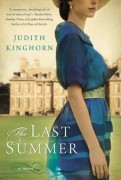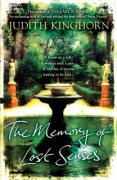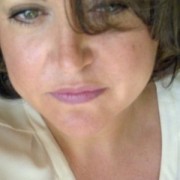But Who will Want to Read it?
An esteemed British writer, one whose novels have been published for half a century, advised me recently not to read my own book reviews – unless they’re written by someone whose opinion you respect.
Good reviews will make you vain, they told me, and the bad ones will crush you. Since then, I’ve tried to follow that advice… but as every new-ish writer knows, it’s all too easy to press a button and take a peek at those online reviews. And after all, it’s what we crave: to be read.
It’s three years since I finished writing what would be my début novel, eventually titled The Last Summer. And it’s been a very busy three years – literally, gone in a flash.
Now, I have an inexplicable nostalgia for my unpublished days, before editorial deadlines, before book promotion, before anyone had read or reviewed my writing.
Those days were – and remain – curiously quiet and private, with an intimacy almost sacrosanct in my memory… like the very first weeks and months of my children’s lives. And those days lasted infinitely longer, and were all about writing. Bliss. There were no critical eyes, no one to put me off my stride or sway me from my innate desire to tell a story, and – eventually, hopefully – for that story to be read. Or that’s how it seems, now, sometimes.
Then, yesterday, I remembered someone, a man… let’s call him a friend of a friend.
As I politely replied to his obligatory, weary-sounding so what are you writing about? he smiled and rolled his eyes – just as though I was the one hundredth wannabe novelist he’d met that day. I should probably add that he was not in publishing (he was a healthcare professional – which I later discovered to be a euphemism for chiropractor), and he was a guest at a party here at my home.
When he interrupted my not-remotely-ready-for-publishers-pitch with, ‘but who will want to read it?’ I knew it wasn’t so much a question as a statement. It was designed to fell me – and it did.
I think all writers suffer self-doubt, particularly unpublished writers, which is what I was at that time.
I loved writing but I wasn’t sure how good my writing was. Securing an agent, becoming published and having readers would, I thought, answer that question.
I veered between moments of incredible clarity and determination and moments of despair and truly agonising self-doubt – when I wondered if I was in fact deluding myself. It’s a common enough affliction. Just because I liked to write didn’t necessarily mean I could write. I realised this. And there were a few others in my midst that had given me that same smile, as though I was what used to be termed ‘feeble-minded’.
Consequently, I dreaded people asking me what I did: I wrote, I was a writer, but I was an unpublished writer, and the world is full of them and I was another.
My husband – ever supportive and patient – had to put up with my one-minute sure and certain self-belief (with pillow-bashing promises of an impending book deal) and next minute angst (and pillow-bashing tears). Was I deluded? – I’d ask him, always late at night when he was trying to get to sleep, and of course, his answer was always ‘no’. Well, he would say that, I’d think, only to ask him again a day or two later. For my children’s sake, I’d decided, I had to finish my novel – and get it published. They’d lived with my writing for so long and had absolute blind faith that there would be a book – at The End; whenever that was to be.
Three years on, with two novels published worldwide and translated into a number of languages, I’m slowly, very slowly beginning to believe that I can tell a reasonably good story. But confidence is an ephemeral state, and it’s impossible to be objective about one’s own work. We have to rely on others’ judgement and feedback… and thus, we’re drawn like moths to the flickering of those online reviews – which can so easily burn us.
Of course writers shouldn’t be treated with Kidd gloves, nor should they be encouraged to think they can write good fiction if they can’t, but every opinion of every book is subjective, delivered by an individual with a unique perspective.
Personally, I prefer to remain silent on a book I haven’t enjoyed or don’t rate. I simply don’t endorse it. And I’m always aware that just because I don’t like something – be it a novel, poem, or painting – doesn’t mean someone else won’t.
I respect creativity, love art in all its forms, and respect those brave enough to produce something from nothing.
So no, we writers shouldn’t let reader reviews crush us; nor should we let them make us vain. And we should never be smug, about anything… But still, I’d like to reply to that man, the one who asked me, but who will want to read it?
Quite a few, it would seem.
—
Judith Kinghorn was born in Northumberland, England, educated there and in the Lake District, at a boarding school once attended by the Brontë sisters. She is a graduate in English and History of Art and worked in London, formerly as managing director of a company then owned by the novelist, the late Josephine Hart. Judith was elected a Fellow of the Royal Society of Arts and nominated a Woman of the Year before giving up her career in order to focus on her family and her writing. She lives in Hampshire, England.
You can follow Judith on twitter @judithkinghorn , Visit her website www.judithkinghornwriter.com or her Author page on facebook.
Category: Being a Writer, British Women Writers, Contemporary Women Writers, On Writing
Comments (14)
Trackback URL | Comments RSS Feed
Sites That Link to this Post
- Featuring Women Writers on WWWB 2013 - Women Writers, Women Books | December 30, 2013
































Ms. Kinghorn, I’ve read all your books and enjoyed each one. However, “The Last Summer” is genius. Your writing and the story you told so captured me that I read it and then listened to it. The narrator, Jayne Wymark was perfect for the audible version. I’m a newbie writer and have turned to your writing many times for inspiration. Not that I could ever write as well as you, but it helps to read writing one admires. Thanks so much for all your books. I am a permanent fan.
Susie
Hi Susie, what a lovely message – thank you so much for your kind words. I agree with you, Jane Wymark read The Last Summer beautifully (though it’s always slightly surreal to hear one’s work read out loud by someone else and never quite how you heard the voice!) And I’m delighted if my writing has inspired you. Like many writers, I’m never entirely satisfied with my own work and like you, I go back again and again to the writers who’ve inspired me.
Good luck with your writing and very best wishes,
Judith
I agree reviews should not crush us or make us vain. When your book is published, you share your masterpiece you have been working on for months or most probably even years, it is exciting to find out what people think about it. It is a one-way communication. You wrote it, you kept it to yourself, after publishing it is accessible to thousands of people.
I think it is actually good for your reflection to learn from your readers. They take the effort in writing a review. Personally I appreciate it. It is rewarding after years of hard work.
By writing a book, you created something unique that will last forever. You share it with the world, and it is good that it really means something to people. It is good to have an opinion about it and people talk about it off- and online. Our industry is build on reviews. It is great as long as the reviews are positive.
If a review is negative, try to learn from it or accept that you cannot make everyone happy. Keep on doing the good things and keep on writing the stories you believe in.
Ah, those smug people that put down writers! It reminds me of that adage “If you can’t xxxx, teach”, which I have always thought would be better rephrased as “If you can’t be supportive – shut up”. I feel the same about the fluctuation of writerly confidence. Not so much when I’m writing for business, that is somehow less personal; but my own work, the stories, poetry that I have invested part of my emotional life in, it is like exposing my soft underbelly and even a tactless prod can wound.
Good for you that your response to all of it was demonstrable and enjoyable success. I loved The Last Summer and I look forward to reading your second book.
Judith,
Thank you for sharing your story. I know personally I have felt many of the same emotions that you mentioned, especially self-doubt. Even after I tell myself that there may not be anyone who wants to read my work, I still can’t stop writing.
There’s a lot to be said for your silence regarding books that you did not enjoy. I think that is valuable advice. Aside from opinions being different, the world is a small place and no one knows if one day that author may be critiquing something they wrote.
Best of luck,
Kristina James
Wasn’t it the great Toni Morrison who said that you should write the book you want to read but haven’t found… so, in that way, you write for yourself, and while we all want readers, in the end, we write what we want to read. That may be the only way to diffuse or reject critique.
Great advice! And I agree 100%.
Thanks.
To not read or at least not be affected by your reviews is incredibly good advice that I suspect almost no author is capable of taking. As you so brilliantly illustrate, we’re contradictory creatures – sure enough of ourselves to devote absurd amounts of time to perfecting single sentences, yet always doubting our abilities, always hoping to be accepted (by agents, publishers and, eventually, readers).
For me, just being able to answer that “What do you do?” question with the simple reply “I’m a writer” was a massive hurdle, one I still sometimes stumble at even with a book I can hold in my hand. I fear the responses of your party guest and Cheryl’s friend, but I suspect only because they mirror my own uncertainties. These uncertainties, though, are a major part of why I write: every story is a challenge, an adventure and an opportunity to discover something new about my relationship with words. The day I think I can write something with ease will be the day I don’t bother picking up my pen.
Thanks, Natalie. So much of what we write about is an exploration, an adventure – which is what makes it frightening and thrilling!
Good luck with your writing.
Judith
Excellent advice. Thank you for sharing your story and your wisdom.
I think all writers must encounter that one person whose remarks or attitude are intended to cut us down. For me it was someone close to my family, someone I’d long relied on for emotional support and sage advice – the person whose opinion I’d have valued most as I wrote my first novel. When asked to read and comment, the response was, “I’ll wait until it’s published,” delivered with tone and expression full of utter certainty that publication would never happen. Absolutely designed to cut me down – and it did. Several years later, I handed that same friend a fresh-from-the-box author copy of the published novel. She congratulated me, admired the dust jacket, and gave the book a place of honour on her bookcase. It’s still there, still unread. No stranger’s review will ever cut more deeply. Others have read and enjoyed that book and I’ve moved on in my writing, so I wonder why part of me still hopes she’ll one day give it a try?
Count me among the ‘quite a few’ who want to read your books, Ms. Kinghorn. THE LAST SUMMER is next up in my audio queue. Looking forward to it!
Hi Cheryl, pleased you enjoyed reading this… and yes, family, too, can sometimes be tricky! I hope that the ‘she’ you mention eventually reads your book, and in the meantime good luck with the writing and thanks for putting The Last Summer in your TBR queue.
Best wishes
Judith
Judith, I reviewed your first book and it was great – people like the guest you mentioned just seem to enjoy putting people down to make themselves feel superior, pathetic really but very undermining, especially when our confidence as writers is always so fragile.
I once asked Lesa Holstein, (www.lesasbookcritiques.blogspot.co.uk) an American librarian whose book review blog I follow, and who is extremely popular, what she did if she found a book really dreadful. She replied that she always tries to find something positive to say, even if the book isn’t to her personal taste – if she can’t even do that, she doesn’t review the book – she said she felt it was essential always to remember that there is a person behind the book.
Best wishes with your future writing, and thanks for being so honest about all the self-doubt, as I always think it’s just me….
Rosemary
Thanks, Rosemary. I’m very much with the author you mention and believe if you don’t have anything positive to say, better to remain silent (- unless you’re a professional book critic, of course!).
Best wishes back to you,
Judith